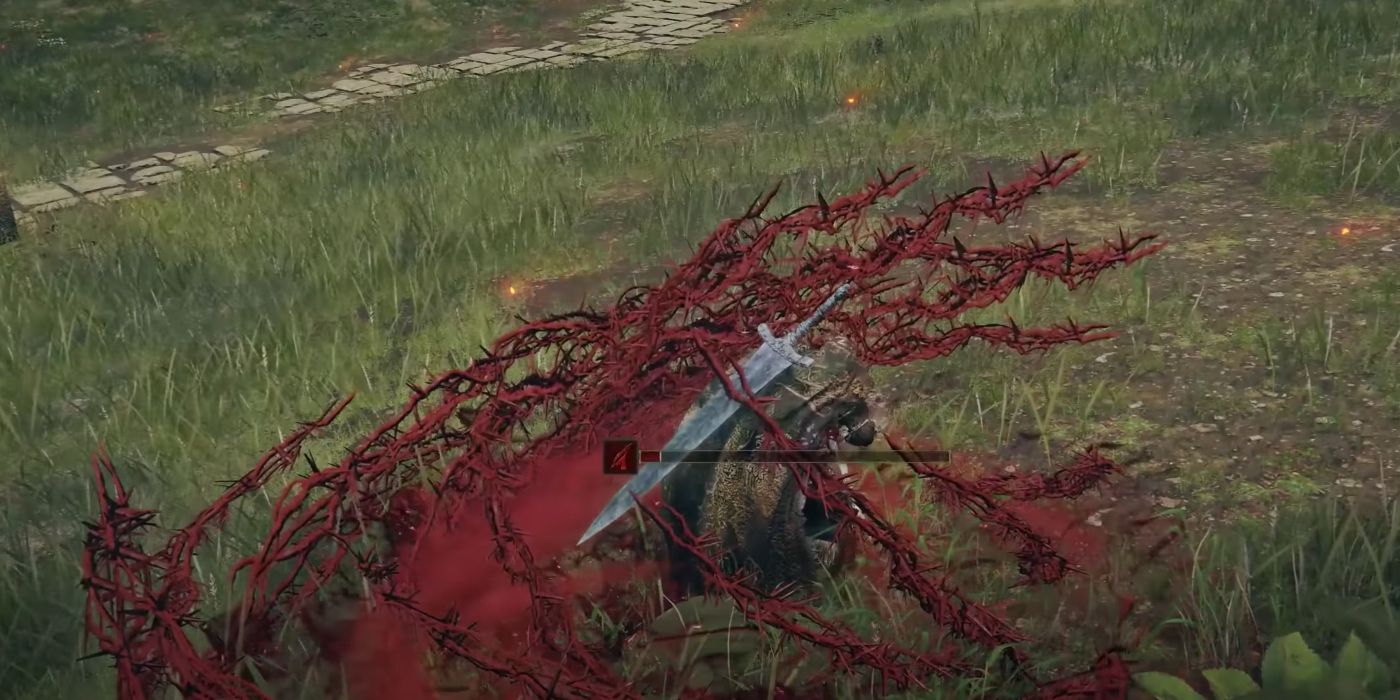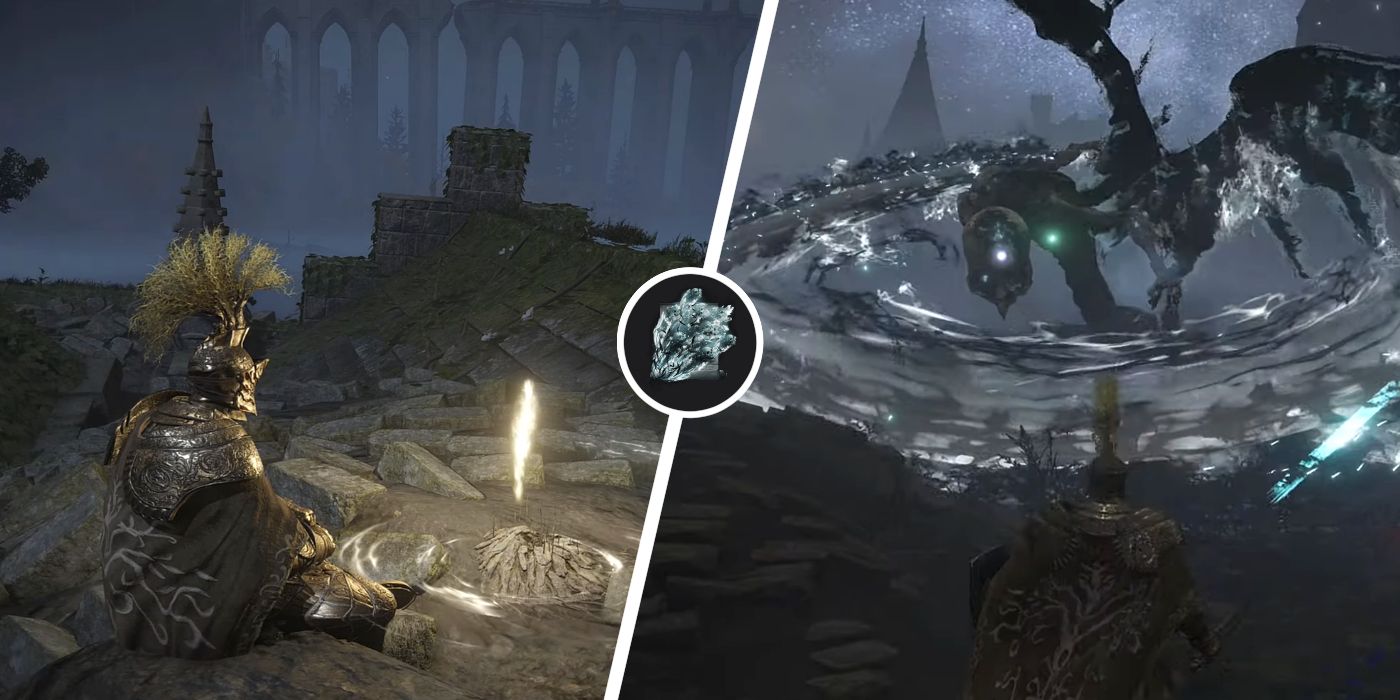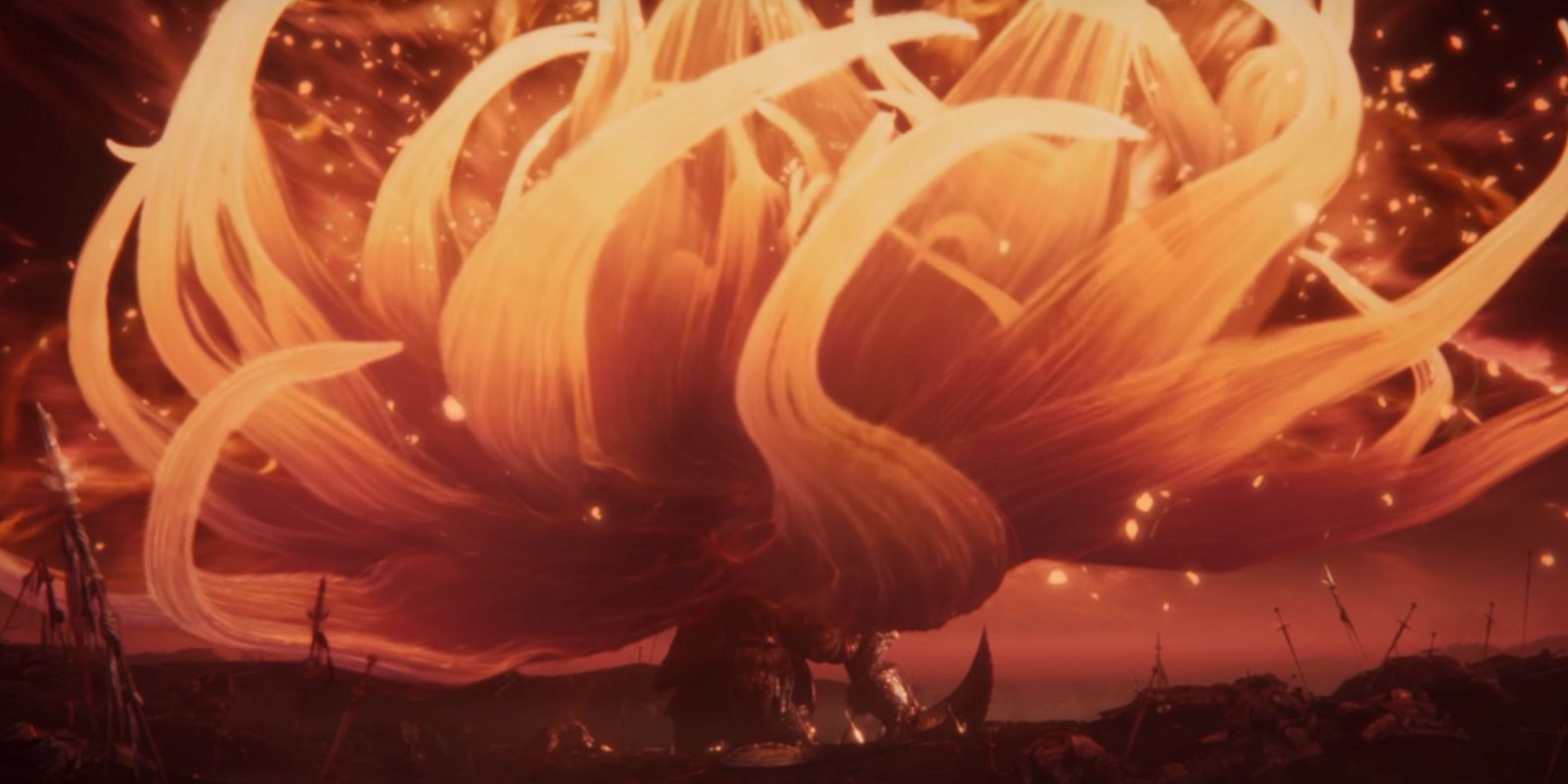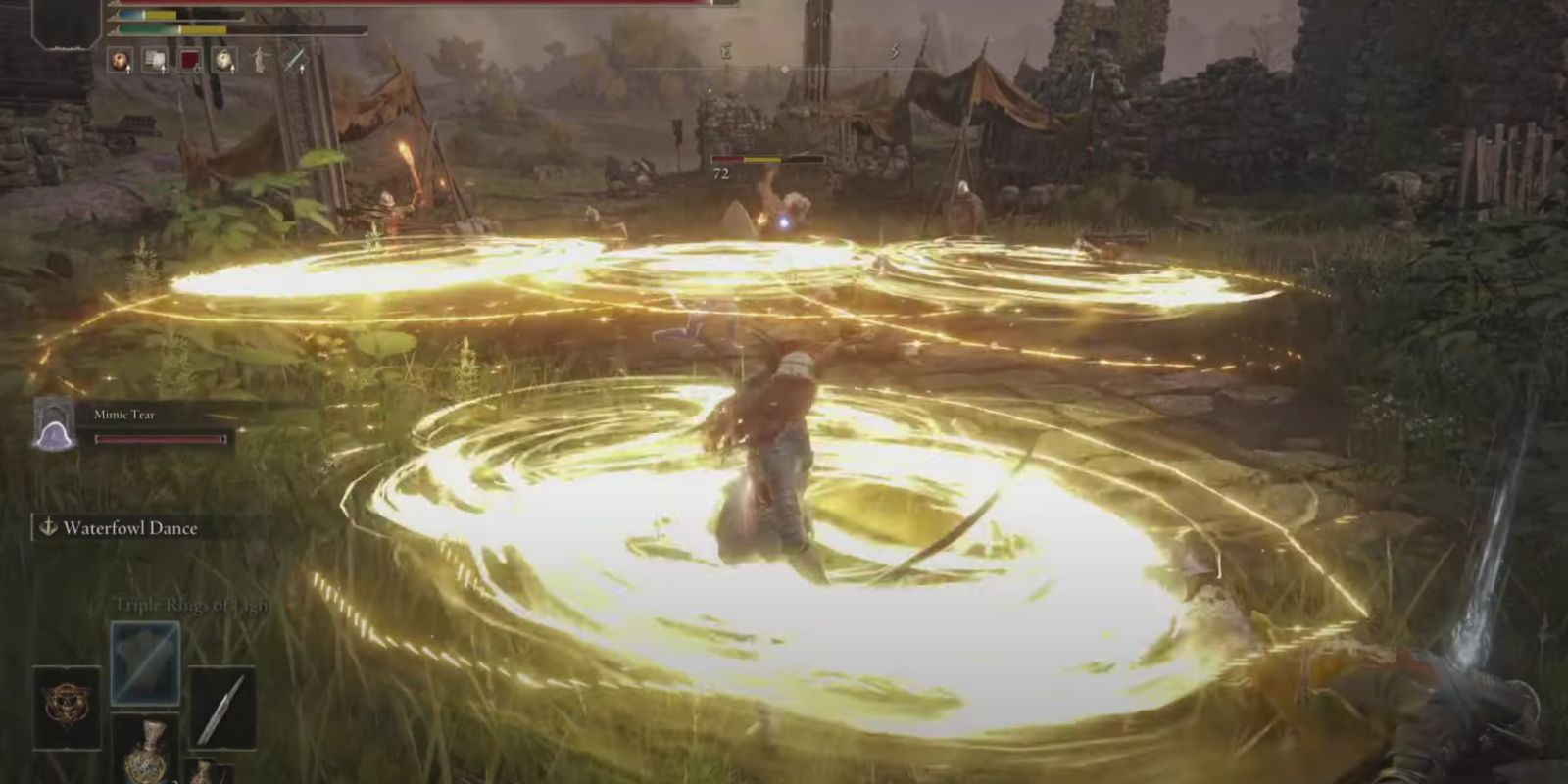Elden Ring and its sheer diversity of Sorcery and Incantation spells available in Elden Ring has somewhat inevitably led to players classifying some spells as underpowered or suboptimal. That said, the recent 1.07 patch has “buffed” many of game’s infrequently used spells, giving once-ignored Incantations like Scarlet Aeonia or Sorceries like Briars of Sin or Explosivie Ghostflame a new chance to shine.
“Challenging but rewarding” seems to be a core design ethos of developers at FromSoftware, which has contributed to the popularity of dark fantasy action-RPGs like Dark Souls, Bloodborne, and now Elden Ring. In the Platonic ideal of a FromSoftware RPG, every open-world enemy, dungeon boss, collectible weapon, and collectible spell should be powerful and punishing, but still possible for any player to overcome with the right tactics and mastery of game mechanics. Elden Ring, large open-world game that it is, hasn’t entirely perfected the formula established by Hidetaka Miyazaki’s genre-defining Demon’s Souls, but does seem to draw closer to perfection with each new software patch.
The latest update for Elden Ring, Patch 1.07, has drawn a fairly positive reaction from its player-base for several reasons. First, this patch has added two types of damage scaling to the game weapons and spells – one for enemies in the game’s open world, the other for player versus player combat. Second, this patch greatly improves the balance of the game by buffing weaker weapons, skills, and spells rather than weakening the strongest of them. Thanks to this design choice, players of Elden Ring who gravitate towards high-tier spells won’t have to rework their character builds, while players interested in the narratively flavorful schools of magic discussed below won’t be penalized as much.
Elden Ring’s Patch Improved The Two Aberrant Sorceries

Thorn or “Aberrant” Sorcery is one of the odder schools of magic in Elden Ring. The two spells of this spare school – Briars of Sin and Briars of Punishment – are classified as Sorceries (i.e. D&D wizard-style magic) and must be cast with a sorcerer’s Glintstone Staff. At the same time, these two spells (and the Staff of the Guilty item that boosts Thorn Sorceries in Elden Ring) have a minimum Faith requirement and no Intelligence requirement at all. In previous versions of Elden Ring, players had to invest heavily into multiple spell-casting stats (Faith, and Intelligence or Arcane) and dual-wield staves in order to maximize the damage caused by the lacerating bloody thorns of this magic school. Patch 1.07 reduced the FP cost and increased the casting speed/blood loss build-up of the Briars of Sin and Briars of Punishment spells, making it easier for players to create a viable Thorn Sorcerer character build at low levels.
Elden Ring’s Latest Patch Improved Death Sorceries

Death Sorceries, many of them strongly associated with Godwyn, Elden Ring‘s Prince of Death, and the Death Rite Bird bosses found in Elden Ring‘s open world by night, are spells that conjure forth both spirits of death and pale flame that inflict the Frostbite status effect. To use spells from this school of sorcery, players must invest heavily into both the Intelligence and Faith attributes, making Death Sorceries (along with Golden Order Incantations) a form of magic primarily used in hybrid spell-casting builds. To better reward players for making a hybrid spell-caster character (challenging in the early phases of an Elden Ring campaign) FromSoftware improved four of the five Death Sorcery spells in Elden Ring‘s latest patch alongside buffed weapons. The FP costs of the Rancorcall and Ancient Death Rancor spells were decreased, while the “lifespan” of the skull projectiles conjured by these spells was increased. The skeleton-conjuring Tibia’s Summons spell also had its FP cost reduced and increased its attack power, casting speed, and recovery time. Finally, the late-game Explosive Ghostflame spell, a point-blank burst attack, was buffed with increased Frostbite buildup, additional attack power and stamina damage, and improved range/damage detection for its residual trails of ghostflame.
Elden Ring’s Latest Patch Improved Scarlet Aeonia

In the hands of Malenia, Blade of Miquella, who can be found in the optional Legacy Dungeon Miquella’s Haligtree and is one of Elden Ring‘s harder bosses, the Scarlet Aeonia is a terrifying attack capable of killing Tarnished player characters in one shot if they fail to dodge. In previous versions of Elden Ring, though, players only made use of the Scarlet Aeonia Incantation for dedicated Malenia cosplay builds. The start-up animation for the attack granted no bonus Poise, making it easy for attacking enemies to interrupt the spell, while the recovery animation for the spell was too long, leaving players trapped in one place. The 1.07 Patch addressed both these issues by adding Poise to the start-up, reducing recovery time and FP cost, and buffing the Elden Ring‘s curable Scarlet Rot-inflicting Incantation’s attack power, stamina attack power, Poise damage, and range all around. With these buffs, Elden Ring players gain access to a situational but dangerous late-game spells and a viable alternative to the Ekzykes’ Decay/Rotten Breath Dragon Communion Incantations if they want to afflict enemies with the dreaded Scarlet Rot status effect.
Elden Ring’s Latest Patch Improved Golden Order Incantations

Golden Order Incantations, in the lore of Elden Ring, are a school of magic based on scientifically analyzing the metaphysical laws that make the divine miracles of the Erdtree and Golden Order possible. As their names and associations would imply, these Incantations frequently manifest as bright, golden light taking various forms. Miquella, Elden Ring‘s eternally youthful and villainous Demigod, studied Golden Order Fundamentalism as a potential way to cure his sister Malenia’s Scarlet Rot affliction, while the mute and mummified Goldmask uses this scholarly school of magic to identify the flaws in the original Golden Order and craft a new Elden Ring that brings justice to all.
In-game, non-combat Golden Order Incantations like Law of Regression are designed to nullify negative status effects and remove buffs on enemies, while most offensive Golden Order Incantations permanently kill undead enemies and conjure forth rings of light that fly forth and return to their caster (besides potentially dealing double damage to enemies, these ring of light incantations also synergize well with projectile-conjuring parry skills of Elden Ring‘s Erdtree Greatshield and the Carian Retaliation Ash of War). Elden Ring‘s recent 1.07 Patch buffed the Discus of Light Incantation by reducing its FP cost, speeding up its casting animation, and increasing the projectile’s range and duration. The Triple Rings of Light Incantation also had its casting speed increased, while the Radagon’s Rings of Light Incantation was buffed with reduced FP cost and recovery time. Finally, the Law of Casuality Incantation, a buff that emits an explosion of holy damage if a PC is heavily, had its duration extended from 60 seconds to 120 seconds. Significant content changes to Elden Ring will have to wait for any potential DLC to release, but FromSoftware has been hard at work improving what is already present in the game, especially its underpowered spells.




